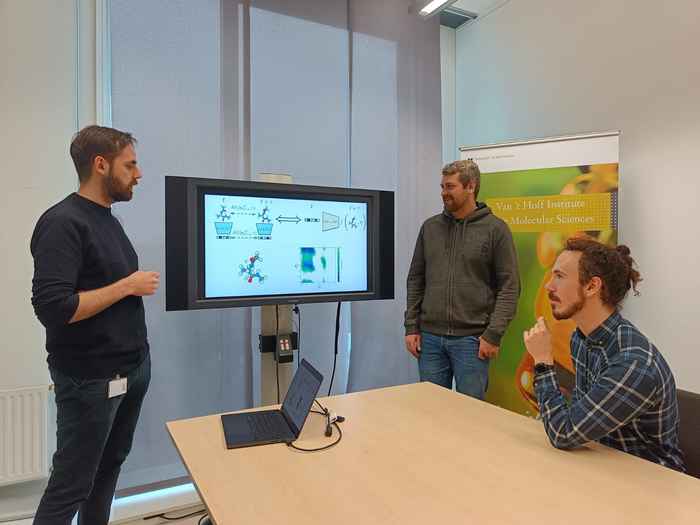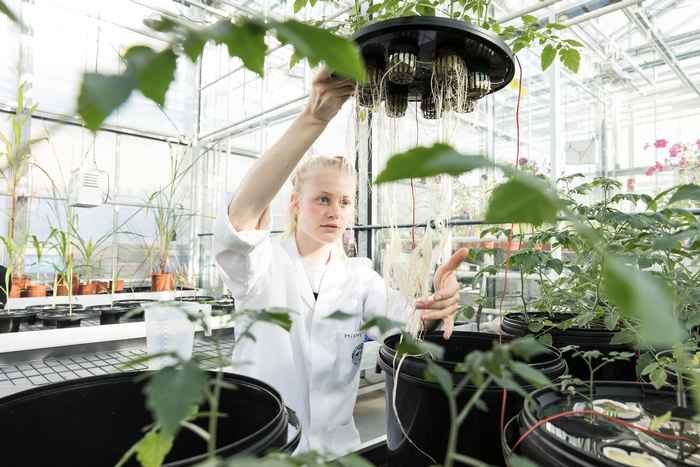AI helps chemists develop new, sustainable materials
5 February 2024
AI is changing the world. We have become familiar with applications like ChatGPT and Dall-E that create texts and images for us with ease. AI can also make a big difference in the field of molecules and materials. It may be less visible, but has potentially at least as big an impact. For Ensing, there is no doubt that the Faculty of Science is the place to be to develop and apply AI to create the molecules and materials needed for a sustainable future. The Informatics Institute (IvI) is one of the best computer science institutes in the world, possessing unique knowledge of AI and Machine Learning. And sustainability is the common thread in almost all research by the chemists at the Van 't Hoff Institute for Molecular Sciences (HIMS).
It is also full on the agenda at the biology, physics and life sciences institutes. Think new chemical processes that enable transition of the economy away from oil, using green electricity and renewable resources instead. Think better and faster degradability, less waste, less energy use. Think new molecules and materials that are lighter, stronger, more 'intelligent' and hyperfunctional.
Molecules and materials that are also inherently safe for humans and the environment. Ensing: 'It’s all about realising the materials transition needed for a sustainable society. For this, AI will prove to be an indispensable tool. Machine learning and computational techniques can predict the relation between structure and property of molecules and materials: their functionality, their degradability and their interactions with the biological environment. This will help to enhance sustainability in areas as diverse as food & agriculture, building materials, green industrial processes, energy transition, consumer materials, health, you name it.'
Molecules as networks, or as words
The research in AI4SMM will build for a part on the pioneering work by IvI professor Max Welling in so-called graph neural networks. Until recently, Welling led the Amsterdam lab of Microsoft’s AI4Science initiative, which also focuses on molecules and molecular simulations (see also box: the Amsterdam AI arena).
Graph neural networks are found in many machine learning applications, including well-known systems for playing the games of chess and go (e.g. those developed by Google’s DeepMind: AlphaZero and AlphaGo). 'A molecule can also be thought of as a network', says Ensing, 'a spatial network in fact, where each node of the network represents the position of an atom, and each network connection describes the interaction between those atoms. This concept leads to so-called geometric deep learning, where AI tries to ‘understand’ molecules through network analysis in the light of molecular properties.'
Another approach is along the path of natural language processing that is known from ChatGPT. 'We then use the language of the chemist', Ensing explains. 'The names of molecules, for instance H2O, can be considered as the words. There’s a 'chemical grammar' behind the relationships between the letters - why is there a 2 following that H - and also between the words - which substances react with each other, and how. Of course that all has its origins in chemical concepts and laws, but in AI, the computer can simply establish relationships based on the concepts of words and grammar.'

We build new molecules and new materials. Using AI to assist us with that, or even do it for us, will change the way we do our science. It will make us less dependent on what you might call ‘chemical intuition'.Bernd Ensing - Associate professor Computational Chemistry
To Ensing, both approaches are worthwhile. He explains that whatever way you build a machine learning system, the approach is to train the AI model with existing data of known molecules. You can then ask the system to design new molecules that have a certain desired property. Through tools like ChatGPT (text) and Dall-E (images), we are already familiar with this generative modelling.
Ensing finds it fascinating to now apply that to the field of chemistry: 'It touches on exactly what we do as chemists: we build new molecules and new materials. Using AI to assist us with that, or even do it for us, will change the way we do our science. It will make us less dependent on what you might call ‘chemical intuition’.' He mentions that recently Google’s Deepmind presented its latest AI tool GNoME, which generated hundreds of thousands of crystal structures of potentially functional materials, using graph neural networks. 'I expect we will see more of such breakthroughs in the years to come.'
Real momentum regarding AI
To kick-start AI4SMM at the Faculty of Science, four 2-year postdoctoral research projects have been funded. These projects are the initial core of what has to become a growing consortium of supervisors, researchers, students, as well as external academic and industrial partners. Ensing: 'I see it as a multi-stage rocket. With the four postdocs, who already are experienced researchers, we are off to a flying start. In the course of next year, we expect to add a number of PhD students. In parallel, we will develop cooperation with partners from academia and industry. To initiate new projects, but also to form a consortium to jointly qualify for substantial funding through national and European funding schemes.' Ensing is optimistic: 'There is real momentum regarding AI, and we hardly need to convince potential partners about the opportunities here at the Faculty of Science. Everyone recognises the fantastic environment here.'
The first four AI4SMM projects (see box) are in areas as diverse as sustainable steel, novel foods, energy storage in salts, and chemical additives for plastics. Assistant professor Alberto Pérez de Alba Ortíz is involved with two of them. As an assistant professor in Computational Soft Matter & Chemistry both at the Van 't Hoff Institute for Molecular Science (HIMS) and the Informatics Institute (IvI), he is the personification of the integration of molecular science with AI.
'One of the biggest challenges in developing novel molecules and materials is the size of what we call the ‘chemical space’. By that we mean all the possible combinations of different types of atoms into molecules, and all the dynamics we can encounter regarding these molecules. You can’t really explore that vast space using normal computational techniques. However, machine learning is a great aid in advancing materials development along this line.'
Extremely multi-scale
As an exciting example, Pérez de Alba Ortíz mentions the project on plant protein mixtures for sustainable food design. This is in the field of the so-called ‘protein transition’, where sustainable, plant-based foods will replace meat. 'The challenge is to ‘design’ attractive foods rich in proteins from soy, lentils, beans and many other possible sources. The focus of our project is on modelling the assembly of multiple plant proteins into an aggregate with the required properties. It might or might not be meat-like, but it must have the right texture, mouthfeel, stickiness, and other parameters for people to enjoy it.'
Researchers from four different institutes contribute to the research, that has an extremely multi-scale nature. 'It goes from a single protein molecule all the way to the real edible food material that will be on your plate', says Pérez de Alba Ortíz. He adds that a single molecule here is far from simple. Proteins are rather complex molecules, consisting of many (possibly hundreds) of amino acid building blocks. Their molecular make-up determines how they fold and how they interact with other proteins.
'In ‘traditional’ molecular simulation you start with atomic models of the proteins and from there on try to simulate their very complex interactions and their aggregation. The problem is that computationally this is extremely costly and time-consuming. Our approach is to use machine learning for making a ‘coarse grained’ model where the proteins are going to be represented by much simpler entities - let's say spheres with interaction patches. And then from this simplistic model, you can run much faster simulations to arrive at the aggregate properties.'
Of course such a model needs training so that the simpler entities still represents the protein in their properties and interaction. 'Our strategy is to work at multiple scales. On the one hand we train from the tiny atomistic perspective; we model the interaction between just a few proteins from basic principles. On the other hand we maintain a much larger microscopic perspective where we train the model using information on parameters such as shear forces between protein layers. Our idea is to perform iterative cycling from both perspectives to train this model of how the mechanical properties of the proteins are related to their molecular make-up.'

We have excellent people in our projects, but we sure need the world renowned experts in AI that are next door. As physicists and chemists we do know about simulation, but AI is not our main focus. So we're integrating our expertise with the Amsterdam AI community.Alberto Pérez de Alba Ortíz - Assistant professor Computational Soft Matter & Chemistry
The researchers are particularly interested in identifying the key aspects that can be tuned to optimize the final product. 'These can be as simple as the quantity of a particular protein that you have in the mixture, or they can be as complicated as a specific amino acid that you want to introduce in a protein. This is where biology comes in: you can introduce mutations in plants to change the amino acids in the protein, and thus the interactions between the proteins and eventually the properties of the final product.' There’s a long way ahead of them, but with all that knowledge, the researchers hope to be able to find ways to process the most sustainable plant proteins into enjoyable food stuffs.
A pressing sustainability issue
Pérez de Alba Ortíz expects the combination of knowledge from physics and chemistry with that of AI to yield surprising results, especially in the AI4SMM setting. 'AI is currently developing extremely fast. We have excellent people in our projects, but we sure need the world renowned experts in AI that are next door. As physicists and chemists we do know about simulation, but AI is not our main focus. So we're integrating our expertise with the Amsterdam AI community.'
To Ensing, bringing researchers together will be one of the main benefits of the AI4SMM programme. 'We are facing a pressing societal sustainability issue to which we as scientists can provide very important solutions. With AI4SMM we hope to make a substantial contribution. I see my role as a facilitator, to make sure we effectively join forces when it comes to achieving results with the application of AI in the fields of chemistry, materials and sustainability.'
He refers to the Manhattan project as a great example of how to make progress and achieve results with a vigorous scientific approach. 'These kinds of consortia are very important: we bring scientists together to work together instead of competing for research funding. And on this topic, we can really set things in motion from Amsterdam. But ultimately, of course, it shouldn't stay in Amsterdam. We really have to think big and start working on a Dutch consortium that is going to make the molecules and materials for a sustainable future.'
The need to transition to a more sustainable society, with a circular economy and healthy environment for people and all other organisms on earth, is one of the biggest challenges currently facing the world.
The UvA's Faculty of Science has developed numerous lines of research and initiatives to help our society navigate this transition in line with the global UN Sustainable Development Goals.
We present all the research around this theme under the heading Green. Examples include the energy transition, environmental issues, challenges related to the global food supply, and the need for a new approach to scarce resources.

